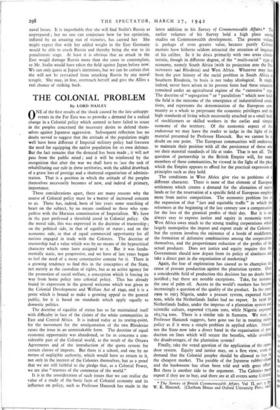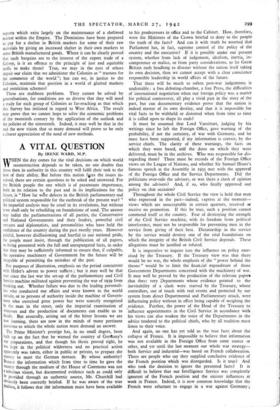THE COLONIAL PROBLEM
By LORD DAILEY These considerations apart, there are many reasons why the course of Colonial policy must be a matter of increased concern to us. There has, indeed, been of late years some searching of heart on the subject, by no means confined to those who sym- pathise with the Marxian commination of Imperialism. We have in the past professed a threefold creed in Colonial policy. On the moral side, this was expressed in the doctrine of trusteeship ; on the political side, in that of equality of status ; and on the economic side, in that of equal commercial opportunity for all nations engaged in trade with the Colonies. The doctrine of trusteeship had a value which was by no means of the hypocritical character which some have assigned to it. But it was funda- mentally static, not progressive, and we have of late years begun to feel the need of a more constructive content for it. There is a growing tendency to find this in the conception of the State, not merely as the custodian of rights, but as an active agency for the promotion of social welfare, a conception which is forcing its way from home policy into colonial policy. This has already found its expression in the general welcome which was given to the Colonial Development and Welfare Act of 1940, and it is a point which is bound to make a growing appeal to the general public, for it is based on standards which apply equally to domestic politics.
The doctrine of equality of status has so far maintained itself with difficulty in face of the claims of the white communities in East and Central Africa. It is indeed today at its testing-point, for the movement for the amalgamation of the two Rhodesias raises the issue in an unmistakable form. The doctrine of equal economic opportunity was abandoned, so far as concerns a con- siderable part of the Colonial world, as the result of the Ottawa Agreements and of the introduction of the quota system for certain classes of imports. But there is a school, and one by no means of negligible authority, which would have us return to it, not only in the interest of the Colonies themselves, but as a proof that we are still faithful to the pledge that, as a Colonial Power, we are also " trustees of the commerce of the world."
It is in the consideration of such issues that we can realise the value of a study of the basic facts of Colonial economy and its influence on policy, such as Professor Hancock has made in the
latest addition to his Survey of Commonwealth Affairs.* The earlier volumes of his Survey hold a high place among studies on Commonwealth development. The present volume is perhaps of even greater value, because purely Colonial matters have hitherto seldom attracted the attention of inquiren of his calibre. In it he deals primarily with two areas charac• teristic, though in different degree, of the " multi-racial " type of economy, namely South Africa (with its projection into the Pro. tectorates awl Rhodesia) and West Africa. Whatever may have been the past history of the racial problem in South Africa of Southern Rhodesia, its basis is not today ideological. It might, indeed, never have arisen in its present form had these countries remained under an agricultural regime of the " extensive " type. The doctrine of " segregation " or " parallelism " which now holds the field is the outcome of the emergence of industrialised condi- tions, and represents the determination of the European con• munity as a whole to perpetuate the economic privileges and the high standards of living which necessarily attached to a small body of stockfarmers or skilled workers in the earlier and simpler economy of the territory. Of the economic aspect of this endeavour we may leave the reader to judge in the light of the material presented by Professor Hancock. But we cannot be in doubt on one point. The European communities will endeavour to maintain their position with all the persistence of those who see their material standards of life at stake. That is not all. The question of partnership in the British Empire will, for many members of these communities, be viewed in the light of the place which the Empire appears to afford for the practical expression of
principles such as they hold. •
The conditions in West Africa give rise to problems of a different character. There is none of that element. of European settlement which creates a demand for the alienation of native lands or for the reservation of a specific field of European employ- ment from native competition. The economic problem lies in the expansion of that "just and equitable traffic" in which the reformers at the beginning of the last century saw a compensation for the loss of the piratical profits of their day. But it is not always easy to express justice and equity in economic terms. West Africa owes much to the strong trading corporations which largely monopolise the import and export trade of the Colonies; but the system involves the existence of a horde of middlemen, the formation of defensive combinations among the corporations themselves, and the proportionate reduction of the profits of the actual producer. Does not justice and equity require that the Government should now depart from its policy of aloofness and take a direct part in the organisation of marketing?
Again, the fear of exploitation has caused us to champion the cause of peasant production against the plantation system. Over a considerable field of production this decision has no doubt been justified ; but there are notable exceptions. Take, for instance, the case of palm oil. Access to the world's markets has become increasingly a question of the quality of the product. In the years 1909 to 1913 Nigeria, under a peasant system, exported 82,0 tons, while the Netherlands Indies had no export. In 1936 the
Netherlands Indies, under the impetus of a plantation system and
scientific culture, exported 172,000 tons, while Nigeria exported 163,714 tons. There is a similar tale in Sumatra. We may, as Professor Hancock suggests, have gone too far in treating native policy as if it were a simple problem in applied ethics. Should not the State now take a direct hand in the organisation of PM" duction on lines which will secure the benefits, while avoiding the disadvantages, of the plantation system?
Finally, take the vexed question of the application of the open' door system. Equity and justice may, on a first view, seem in
demand that the Colonial peoples should be allowed to buy in the cheapest market. The parable of the Japanese rubber-shots and the hookworm 'has often been told and with great effect But there is another side to the argument. The Colonies mu
.
export if they are to buy, and there are at all events some Colonial * The Survey of British Commonwealth Affairs. Vol II, part W. K. Hancock. (Chatham House and Oxford University Press. 165'
exports which exist largely on _the maintenance of a sheltered market within the Empire. The Dominions have been prepared
to pay for a shelter in British markets for some of their raw materials by giving an increased shelter in their own markets to some British manufactured goods. Where it can be clearly proved that such bargains are to the interest of the export trade of a Colony, is it an offence to the' principle of just and equitable traffic to make them? True, we may in the eyes of others impair our claim that we administer the Colonies as " trustees for the commerce of the world "; but can we, in justice to the Colonies, maintain that position in a world of glutted markets and restriction schemes?
These are stubborn problems. They cannot be solved by generalisations, for conditions are so diverse that they will need a study for each group of Colonies as far-reaching as that which this Survey has initiated in regard to West Africa. The result may prove that we cannot hope to solve the economic problems of the twentieth century by the application of the outlook and the policies of the nineteenth. Indeed, it may well be that in the end the new vision that so many demand will trove to be only a clearer appreciation of the need of new methods.



























 Previous page
Previous page